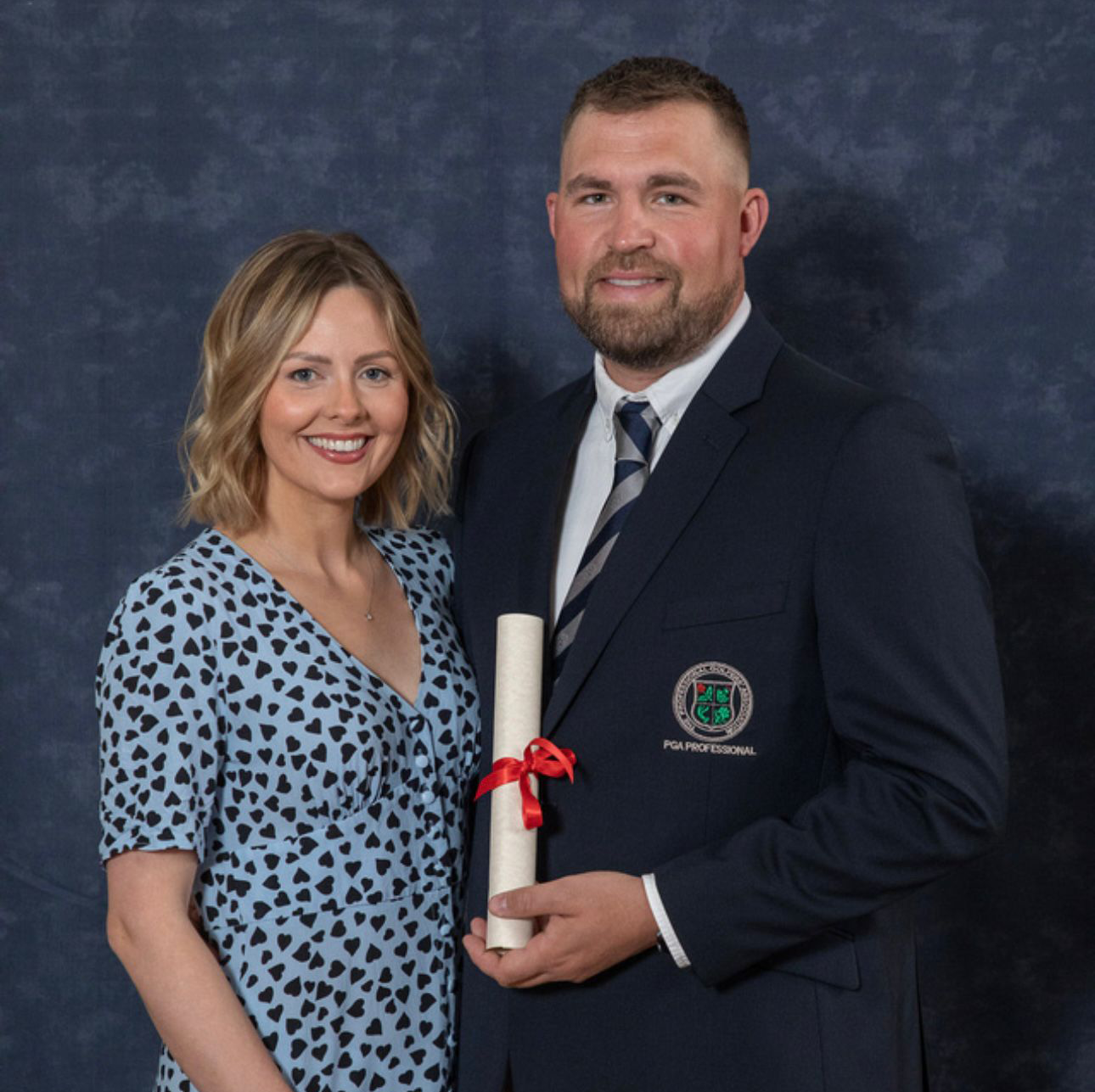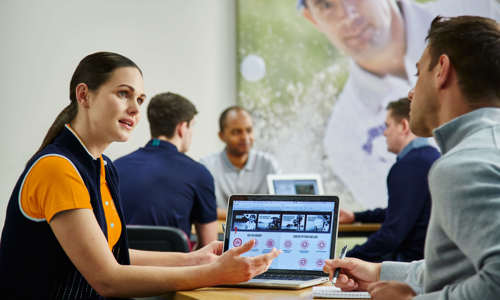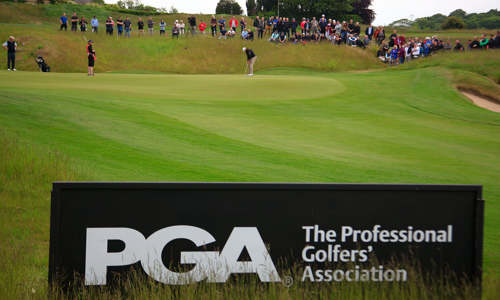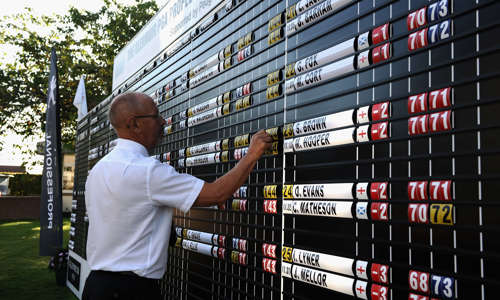Charlie Sadler's story is one of two halves. The opening part documents how a highly-talented rugby prospect saw his dreams shattered through serious injury. But the second aspect reveals how a young man put back together the pieces of his life to become a PGA professional, sharing his knowledge of elite-level sport with future golf stars at Culford School and beyond.
It was a big-game moment that ended up having a big-life impact. March, 2012 and Northampton Saints full back Charlie Sadler powered in for the cover tackle as future England rugby international Semesa Rokoduguni sped towards the try-line. “I was going as fast as I could, he was going as fast as he could,’ said Sadler.
The Saints man hurled himself into the tackle, low and hard to meet a powerhouse opponent representing the British Army team. It was a tremendous try-saving challenge, but came at a heavy price. Knee thudded into shoulder and from that split-second Sadler’s world turned upside down. A 20-year-old rugby professional for one of Europe’s top clubs, his career prospects appeared bright. Sadler had played for England Under-16 A team and progressed through the ranks at Northampton to the point where regular first-team rugby was within touching distance. But the “complete freak accident” in front of thousands at Franklin’s Gardens (Saints’ home ground) changed everything.
“When I hit him, it was like banging your funny bone in your elbow – everything kind of went numb,” said Sadler, now aged 32. “I remember looking up, focusing on the crowd. I knew where I was at the time, but not the extent of the injury. The ref came over, went to put his hand on my shoulder to see if I was alright and then saw it wasn’t okay. I was taken off and went to the doc’s room. I could see the doc touching me, but couldn’t feel him touching me. I thought it must be the dislocation, so they put the dislocation back in. Again the docs asked me the question, ‘Can you feel that’?” Sadler still responded in the negative. He had lost all sensation in his right shoulder.
The seriousness of the situation began to sink in the following day when he attended a nerve specialist. During some tests he saw the nurse shake her head in a silent exchange with the doctor. Sadler knew then that things didn’t look good. “They sent me down to London – I had a nine and a half hour operation,” he said. “They basically peeled my pectoral off, found the auxiliary nerve that runs over the top of your shoulder. and took nerve from my triceps and put it into the shoulder. I suppose the operation was successful because I had feeling, but in terms of continuing rugby, no. That was a no-go.”
Game over. Within months of the injury occurring, Sadler moved from his home in Northampton to living with his mum and dad in the small historic town of Hadleigh in Suffolk. It was a dark time. He found it difficult to process how his rugby career was finished – not because of any lack of ability, but as a result of a physical issue unluckily sustained in the heat of battle. And then there was the future; he felt lost when considering what may lie ahead in his life.
“I mentally really struggled and I never let anyone see that I did,” Sadler reflected. “I’m very good at hiding problems, I was not really talking to anyone – not even my mum, who’s a nurse. All my friends, all my life as a youngster from 17 to 20 was up in Northampton, it wasn’t in sleepy old Hadleigh. I signed up on the dole, I had no job, I thought ‘What am I going to do with life’?”
He tried his hand as a personal trainer at a gym in Colchester and then worked for an irrigation installation company. But one lunchtime when Sadler “was sat in the van with my Coop meal deal”, he saw an online advert for a job in front-desk reception at Culford School. He knew the establishment – between Mildenhall and Bury St Edmunds – from having trained there during the early days of his association with Northampton Saints. He applied, got the gig and began work at the Suffolk school in 2015.
It wasn’t long before word of his previous sporting achievements began to circulate and he found himself redeployed as a rugby coach at Culford. Initially, he found enjoyment in returning to the game in which he had excelled throughout his teenage years. His knowledge of elite-level rugby helped in nurturing Tommy Freeman, now a Northampton and England star.
But everyday participation in rugby came with a downside. It reminded him of his previous existence; a place where his dreams would now never be fulfilled. And it didn’t help that he was still getting calls from clubs enquiring about playing possibilities. “All the memories started to come flooding back,” said Sadler. “I thought ‘I need to get out of this game’.”
Which is where golf and the PGA came to the fore in 2019. A few years earlier, Sadler had begun playing golf with his dad, a soldier in the Royal Electrical and Mechanical Engineers. Father and son teed it up regularly at Newton Green Golf Club in an atmosphere of healthy competition (the pair still play annually for a reconditioned 3-wood mounted on a piece of slate and awarded each year at the family’s Christmas lunch!).
Sadler threw himself into every aspect of the degree course. In particular, he relished the residential weeks that are such an important part of the three-year programme. While others raised a slightly reluctant eyebrow when it came to certain elements of a workshop session on club building, Sadler couldn’t volunteer quick enough. “I’d never put a grip on a club. I was like, ‘Give it to me!’ I learnt a lot from the PGA.”
Sadler’s acquired knowledge from the Foundation degree sits alongside the experience he gained from his years at Northampton. The Saints star player at that time was All- Blacks ace Carlos Spencer, while future England captains Dylan Hartley and Courtney Lawes were also in the building. “Learning from people like that is invaluable,” said Sadler. “You can’t put any money on that. Courtney Lawes, from seeing him as a youngster when I was 13, 14 and he was in the senior academy above us, was a great mentor. He’d come into our changing room and say ‘Boys, are you okay, do you need anything?’ He was a fantastic guy to learn from.”
Some of those top-level sport insights are what Sadler brings to his role at Culford – especially with those pupils that are eying a career in golf. Advice on agents, the fine details of what it takes to thrive as an elite performer – that’s the sort of added value Sadler reckons he can offer.
When it comes to coaching style, Sadler blends the use of technology, a watchful eye and, not least, old-fashioned common sense. It’s his belief that a good coach doesn’t always need to intervene…occasionally, silence is golden. ‘That’s the biggest thing I’ve learnt. I’d thought because you’re there coaching someone, you need to say something. But if a kid is flushing it in front of you, what are you going to change?’ Another piece of rock-solid pragmatism revolves around accountability. “The kid needs to take control of their game,’ he said. ‘They’re on holiday 18 weeks of the years, so what are they doing when we’re not there? Take ownership of anything you do.”
The latter point, something his father instilled, is exactly what Sadler has done in reinventing his own working life; the proof came earlier this spring when he graduated as a fully-qualified PGA professional. The hard yards had paid off for a man who is now not just a key cog within Culford’s renowned golf academy, but also someone who has launched adult coaching sessions using the school’s state-of the-art facilities. Plus, he is part of the Suffolk Golf Union coaching set-up, developing the county’s Under-14s squad. “I’m so happy what I’m doing now,” said Sadler, who is married and has a young family of his own.
Charlie Sadler’s is an inspiring comeback story, like many of the good ones in sport. And the best bit is, it’s only just begun.





































